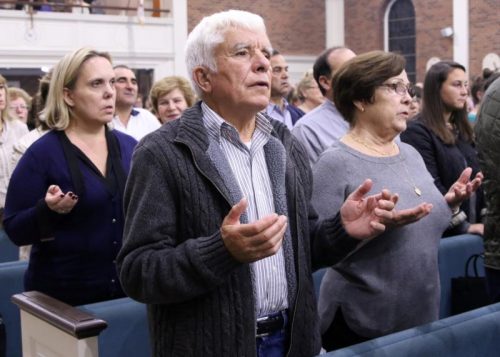Q. Are there restrictions as to which scriptural readings may be used at a Catholic funeral Mass? My dad has told me that he wants Matthew 25:31-40 to be read when he dies. He has always liked that reading and has lived his life accordingly. Is there any reason this passage could not be used at his funeral? (Northampton, Pennsylvania)
A. The Order of Christian Funerals is the ritual book approved for Catholic funerals in the United States. In it is offered a selection of 45 different scriptural passages for the first and second readings of the Mass and for the Gospel.

In most parishes, it is customary for the pastor or a member of the parish staff to meet with the family of the deceased to decide which of the readings will be selected for the funeral Mass. Often, the family also has input as to what musical pieces will be played and sung. Many parishes publish a booklet containing some of the more popular scriptural passages, so that the family can read and reflect before making their selections.
The passage that your father favors — in which Jesus welcomes into heaven those who have been kind to the needy, saying, “I was hungry and you gave me food” — is, in fact, one of the suggested readings.
Other scriptural passages that are frequently chosen include: Wisdom 3:1-9 (“The souls of the righteous are in the hand of God”); Romans 6:3-9 ( “Just as Christ was raised from the dead by the glory of the Father, we too might live in newness of life”); Romans 8:31b -35, 37-39 (“If God is for us, who can be against us?”); and the Gospel of John 14:1-6 (“In my Father’s house, there are many dwelling places”).
I have often found that, in planning a funeral, sensitive attention to the desires of the family can go a long way to comfort people in their time of sorrow.

Q. For years I had been puzzled by the words “lead us not into temptation” in the Our Father. It always seemed to me unlikely that God would do that, and I wondered whether the phrase had been mistranslated. Now that Pope Francis has agreed that this wording is strange, I wonder if something like “leave us not in temptation but deliver us from evil” would be more correct. (Crozet, Virginia)
A. You should be credited for having seen the difficulty. (Many people, I’m afraid, have prayed the Our Father for years without reflecting on that phrase, without seeing a problem.) And now you have Pope Francis in your corner. In December 2017, in a series of televised conversations about the Lord’s Prayer with an Italian Catholic prison chaplain, the pope said, “It’s not (God) who pushes me into temptation to see how I fall. … The one who leads us into temptation is Satan.”
While not ordering a new translation of the prayer, the pope noted that French bishops had decided that, beginning on the first Sunday of Advent in 2017, French Catholics would say the equivalent of “do not let us enter into temptation.”
The prayer is taken from the Gospels of Matthew and Luke, written originally in Greek. The revised edition of the New American Bible, which is the basis for the Lectionary used at Masses in the United States, translates the petition as, “do not subject us to the final test.”
The Catechism of the Catholic Church admits the difficulty of translating the Greek verb by a singe English word, noting, “the Greek means both ‘do not allow us to enter into temptation’ and ‘do not let us yield to temptation'” (No. 2846).
Questions may be sent to Father Kenneth Doyle at askfatherdoyle@gmail.com and 30 Columbia Circle Dr., Albany, New York 12203.






















